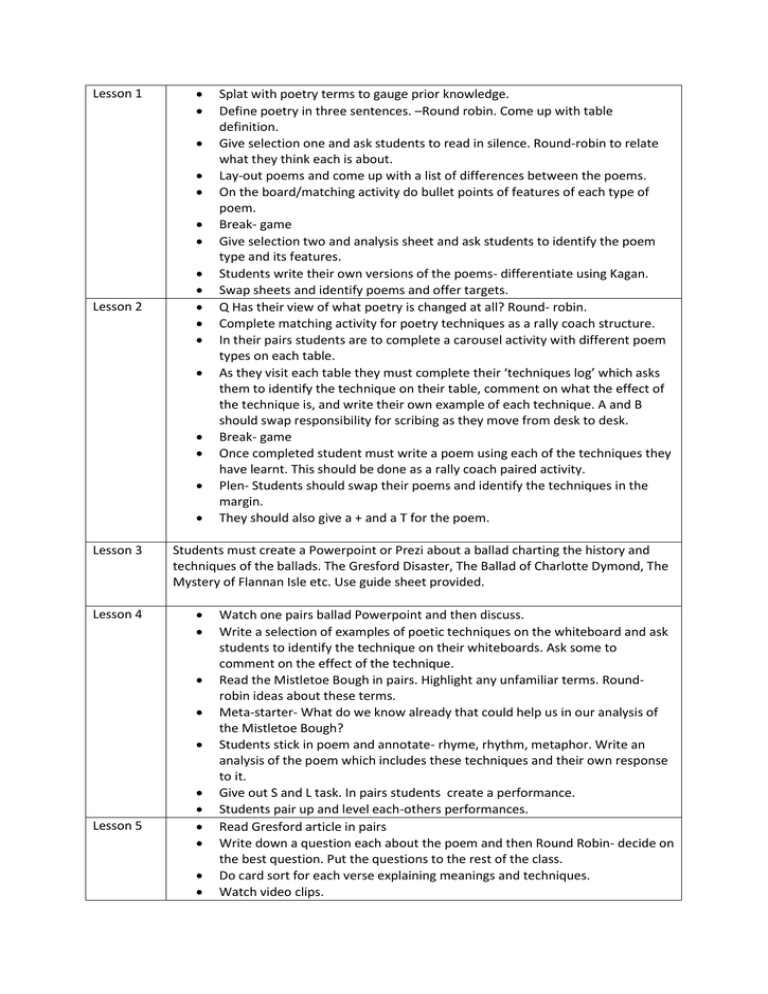Year 8 Poetry ST SOL
advertisement

Lesson 1 Lesson 2 Lesson 3 Lesson 4 Students must create a Powerpoint or Prezi about a ballad charting the history and techniques of the ballads. The Gresford Disaster, The Ballad of Charlotte Dymond, The Mystery of Flannan Isle etc. Use guide sheet provided. Lesson 5 Splat with poetry terms to gauge prior knowledge. Define poetry in three sentences. –Round robin. Come up with table definition. Give selection one and ask students to read in silence. Round-robin to relate what they think each is about. Lay-out poems and come up with a list of differences between the poems. On the board/matching activity do bullet points of features of each type of poem. Break- game Give selection two and analysis sheet and ask students to identify the poem type and its features. Students write their own versions of the poems- differentiate using Kagan. Swap sheets and identify poems and offer targets. Q Has their view of what poetry is changed at all? Round- robin. Complete matching activity for poetry techniques as a rally coach structure. In their pairs students are to complete a carousel activity with different poem types on each table. As they visit each table they must complete their ‘techniques log’ which asks them to identify the technique on their table, comment on what the effect of the technique is, and write their own example of each technique. A and B should swap responsibility for scribing as they move from desk to desk. Break- game Once completed student must write a poem using each of the techniques they have learnt. This should be done as a rally coach paired activity. Plen- Students should swap their poems and identify the techniques in the margin. They should also give a + and a T for the poem. Watch one pairs ballad Powerpoint and then discuss. Write a selection of examples of poetic techniques on the whiteboard and ask students to identify the technique on their whiteboards. Ask some to comment on the effect of the technique. Read the Mistletoe Bough in pairs. Highlight any unfamiliar terms. Roundrobin ideas about these terms. Meta-starter- What do we know already that could help us in our analysis of the Mistletoe Bough? Students stick in poem and annotate- rhyme, rhythm, metaphor. Write an analysis of the poem which includes these techniques and their own response to it. Give out S and L task. In pairs students create a performance. Students pair up and level each-others performances. Read Gresford article in pairs Write down a question each about the poem and then Round Robin- decide on the best question. Put the questions to the rest of the class. Do card sort for each verse explaining meanings and techniques. Watch video clips. Lesson 6 Lesson 7 Lesson 8 Lesson 9 Do press conference- Top 2 on table write first-hand accounts of survivors, relatives and rescue workers. Others write questions to ask them. Hot seat. Do newspaper basics- headline, subheading, topic sentence, masthead, captions. Students write headline subheading and topic sentence for articles about the Gresford Disaster. Write a topic sentence about the previous lesson. Swap and identify who, what, where and when. Write a fact and an opinion about- themselves, school, a friend, their bedroom. Do timed pair share about the definition of a fact and an opinion and write in their books. Label the features on a tabloid and broadsheet newspaper and then complete the comparison sheet. Finish Gresford articles. On whiteboards do true or false statements or features of a tabloid or broadsheet. Do peer assessment of Gresford disaster articles. Read the first Stanza of The Sad Story of Lefty and Ned. Students plan the subsequent stanzas as a flow diagram. They write their own ending for the poem matching the style and structure of the original Do a paired read of the Highwayman Students write 3 questions about the poem-round robin-whole class. Clarify any unknown terms. Students storyboard the poem. More able to select quotes. Less able to paraphrase the poem. Ask students to answer- How might life on other planets be different to our own? Explain that the poem is about a Martian’s view of us. Give each table ‘A Martian Sends a Postcard Home’ cut up into four sections (keep two as extras for later). Give the class three minutes thinking time to try to work out what their section is about. They must then go into expert groups depending on their number 1a, 1b, 2a, 2b etc. In these groups they must round-robin what they think their bit means. What is it about? What do the images suggest. They must then go back to their table and explain what their section means to the rest of their table. They must then swap their quote with their face partner and write PEE statement about the technique that has been used and what it suggests. Students must then swap again and draw the section they now have- could be used for a display. Student then imagine the martian has wandered into school. How would they think about the various thing they would see? They must write a poem about A Martian’s Visit to Lady Lumley’s Swap their poems and try to identify what their partner is writing about.





